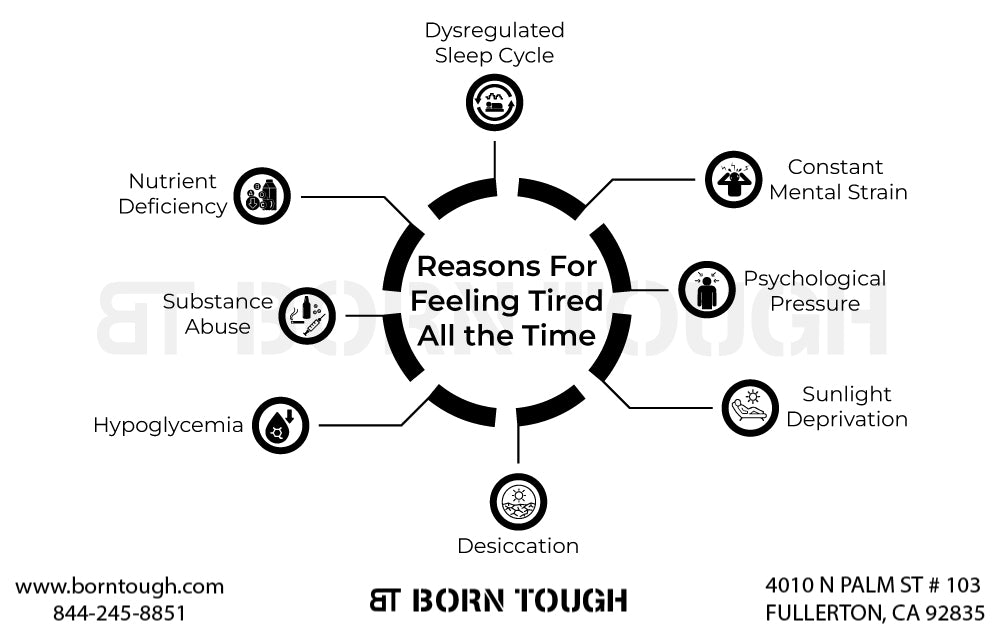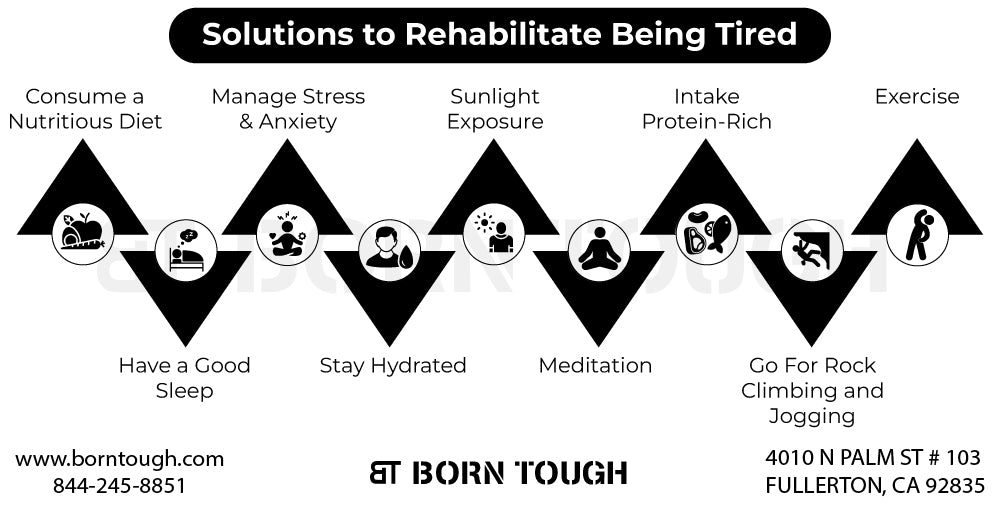Do you often find yourself feeling fatigued, sluggish, and lacking the energy to tackle your daily tasks? If so, you are not alone. Many people struggle with chronic tiredness, and it can be frustrating when you can’t seem to shake it off no matter how much sleep you get or the caffeine you consume.
But what if we told you that there are specific reasons why you are always tired and that there are practical solutions to help you regain your energy levels? In this article, we will explore the top reasons for fatigue and provide actionable tips to help you boost your energy and productivity.
Table of Contents
- 1. X Reasons You Are Always Tired
- 1.1. Sleep Cycle is Disturbed
- 1.2. Low Nutrients in the Body
- 1.3. Use of Addictive Drugs
- 1.4. Low Sugar Levels
- 1.5. Medical Conditions That Cause Fatigue
- 1.6. Lack of Exercise
- 1.7. Dehydration
- 1.8. Lack of Sunlight
- 1.9. Stress and Anxiety
- 1.10. Mental Health
- 2. Solutions
- 2.1. Eat a Balanced Diet
- 2.2. Establish Healthy Sleep Habits
- 2.3. Manage Stress and Anxiety
- 2.4. Get Essential Nutrients
- 2.5. Stay Hydrated
- 2.6. Get Enough Sunlight
- 2.7. Include Workouts in Your Busy Routine
- 2.8. Outdoor Activities
- 2.9. Protein Foods
- 3. FAQs
- 3.1. Can Diet Affect Your Energy Levels?
- 3.2. Can Exercise Help With Fatigue?
- 3.3. Why am I Tired All the Time?
- 4. Takeaways
1. X Reasons You Are Always Tired

1.1. Sleep Cycle is Disturbed
The most obvious reason for feeling tired is a lack of quality sleep. When you don’t get enough rest, your body can’t function properly, and you will likely feel lethargic and demotivated. However, it's not just the quantity of sleep that matters, but also the quality.
1.2. Low Nutrients in the Body
Low levels of essential nutrients can contribute to persistent fatigue and decreased energy levels. Nutrients play a critical role in the body’s energy production and retaining processes, and deficiencies in certain vitamins and minerals can cause a range of symptoms, including fatigue, weakness, and difficulty concentrating. Constant fatigue can trigger the symptoms of these chronic complications:
Anemia is a condition characterized by fatigue, weakness, and shortness of breath. If left untreated, anemia can lead to more serious health problems, including heart failure and organ damage.
Low levels of vitamin D have been linked to fatigue , depression, and other mood disorders.
Magnesium deficiency can also be triggered by chronic fatigue and has been linked with a range of other health problems, including hypertension, heart disease, and diabetes.
Low levels of B vitamins have been linked to fatigue, weakness, and cognitive complications.
1.3. Use of Addictive Drugs
Addictive substances give users an instant spike of happy chemicals by the synthetical process of stimulating brain chemistry followed by neurological responses triggering the feeling of being extremely loved, calmness, enhanced attentiveness, prolonged focus, and sense of above and beyond.
But there is a catch, this spike is followed by an instant nosedive of these exhilarated emotions short after the high spike. It can have a detrimental impact on energy levels and leave the substance abusers feeling constantly mentally and physically tired and burned out. These are some of the after-effects of drug use and abuse:
Depressant Effects: Many drugs, including alcohol, benzodiazepines, and opioids, have depressant effects on the central nervous system. This can lead to drowsiness, fatigue, and decreased energy levels.
Disrupting Sleep: Most drugs disrupt your sleep patterns, making it difficult to get a much-needed deep sleep. Stimulants like cocaine and methamphetamine can cause insomnia, while sedatives like barbiturates and benzodiazepines can cause excessive drowsiness.
Dehydration: Certain drugs can cause dehydration, which can lead to fatigue and decreased energy levels. Stimulants like cocaine can cause excessive sweating, leading to dehydration, while alcohol can cause dehydration by increasing urine.
Nutrient Deficiencies: Drug use can also lead to nutrient deficiencies, as many drugs can interfere with the absorption and metabolism of nutrients. This can lead to fatigue and other symptoms of malnutrition.
Withdrawal Symptoms: When you stop using a drug after prolonged use, you may experience withdrawal symptoms, including fatigue and low energy levels. These symptoms are common with almost all drugs.
Chronic Health Problems: Prolonged drug use can lead to chronic health problems including fatigue and decreased energy levels.
1.4. Low Sugar Levels
Low blood sugar, also known as hypoglycemia, can cause a range of symptoms, including fatigue, dizziness, confusion, and weakness. When your blood sugar drops below normal levels, your body doesn’t have enough glucose to fuel your cells and organs, leading to a feeling of exhaustion.
Low blood sugar can affect your cognitive function, causing brain fog, confusion, and difficulty in concentrating. This can make it difficult to stay alert and focused throughout the day.
1.5. Medical Conditions That Cause Fatigue
Sleep Apnea is a sleep disorder in which disrupts your breathing patterns mostly during sleep. This can disrupt your sleep and leave you feeling tired during the day.
Hypothyroidism is a condition in which your thyroid gland doesn’t produce enough thyroid hormone. This can slow down your metabolism and leave you feeling tired and sluggish.
Chronic Fatigue Syndrome (CFS) is a complex disorder characterized by persistent fatigue that isn’t relieved by rest. The exact cause of CFS is unknown, but it is thought to be related to a combination of factors, including viral infections, immune system problems, and hormonal imbalances.
Diabetes is a condition in which your body doesn’t produce or use insulin effectively, which can lead to high levels of blood sugar. This often results in prolonged fatigue.
Depression can cause persistent feelings of sadness, hopelessness, and fatigue. Depression can disrupt your sleep patterns and make it difficult to get out of bed.
1.6. Lack of Exercise
Regular exercise or physical activity is essential for maintaining optimal physical and mental health. When we engage in physical activity, our bodies release endorphins, which are natural chemicals that help us feel good and reduce feelings of pain and stress. Lack of exercise decreases your energy levels and adds to your stress.
1.7. Dehydration
Water is essential for energy production in the body. Dehydration can cause your blood to thicken, making it more difficult for your body to circulate oxygen and nutrients to your organs and muscles, leading to fatigue.
1.8. Lack of Sunlight
Sunlight plays an important role in regulating our sleep-wake cycle, also known as our circadian rhythm. This lack of sunlight can disrupt our circadian rhythm, leading to feelings of fatigue and drowsiness during the day and difficulty sleeping at night.
Without enough sunlight, our bodies may not produce enough vitamin D, which plays a role in maintaining strong bones and muscles, as well as regulating our immune system.
1.9. Stress and Anxiety
One of the most common symptoms of stress and nervousness is fatigue. When you are feeling stressed or anxious, your body produces more cortisol which is a stress hormone. Stress can cause your muscles to tense up, which can lead to physical fatigue. When your muscles are constantly tense, they use up more energy, leaving you feeling drained and exhausted.
1.10. Mental Health
One of the reasons you always feel tired is that you pay little to no attention to your mental health. Mental health is as important as physical health.
2. Solutions

2.1. Eat a Balanced Diet
To ensure that you are getting adequate levels of essential nutrients, it is important to eat a balanced diet that includes a variety of nutrient-rich foods. Leafy greens, nuts, seeds, whole grains, lean proteins, and healthy fats are all good sources of essential vitamins and minerals. Additionally, taking a daily multivitamin supplement can help ensure that you are getting all the essential nutrients your body needs.
If you are experiencing persistent fatigue despite making lifestyle changes and ensuring that you are getting adequate nutrition, it is important to talk to your doctor. Low energy levels can be a symptom of a range of underlying medical conditions, and your doctor can help determine if further testing or treatment is necessary.
2.2. Establish Healthy Sleep Habits
Try to sleep and wake up at the same hours, make a routine for sleep and morning even on your rest days. This helps regulate your body’s internal clock and can lead to better-quality sleep. Additionally, it is important to create a relaxing sleeping routine to help you unwind and prepare for sleep.
You can read a book or go for a therapeutic bath at night to relax your body and mind. Aim for 7-9 hours of sleep every night.
2.3. Manage Stress and Anxiety
You need to practice relaxation techniques such as deep breathing, meditation, and yoga. They are all great ways to relax the body and mind. These techniques can help reduce stress and anxiety, leading to improved sleep and increased energy levels.
2.4. Get Essential Nutrients
Add carbs to your diet. Do not indulge in excessive dieting which will only result in low sugar levels and weakness. Work on your body by providing it with all the necessary vitamins and minerals. Eat foods that contain iron and magnesium. Drink a lot of water every day to keep your skin and body fresh.
2.5. Stay Hydrated
Do you often feel tired and lethargic, even after getting enough sleep? If so, you may be dehydrated. Dehydration is a common cause of fatigue, and staying hydrated can help improve your energy levels throughout the day.
Drink 8-10 glasses of water every day. Eat foods that are rich in water content. You certainly have to avoid alcohol and caffeine if your goal is to recover from fatigue.
2.6. Get Enough Sunlight
Spend time outside: Try to spend at least 30 minutes outside each day, preferably in the morning when the sun’s rays are the strongest.
Take a walk: Walking is a great way to get outside and soak up some sun. It is also a gentle form of exercise that can help boost energy levels.
Open your curtains: Make sure to open your curtains and blinds during the day to let natural light into your home or office.
Consider a light therapy lamp: If you live in a darker climate or have trouble getting enough sunlight, a light therapy lamp can help mimic the effects of natural sunlight.
2.7. Include Workouts in Your Busy Routine
Make exercise a priority. This means carving out time in your schedule for physical activity. Start by blocking off 30 minutes to an hour each day for exercise. Exercise doesn’t have to be a solitary activity.
In fact, working out with others can be a great way to stay motivated and have fun. Consider joining a fitness class or finding a workout buddy to help keep you accountable. The key to sticking with an exercise routine is to find activities you enjoy. This could be anything from jogging to yoga to dancing.
2.8. Outdoor Activities
You can also go for outdoor activities such as swimming, cycling, and rock climbing. These are also considered exercises and act as a break from your daily busy schedule.
2.9. Protein Foods
Protein is one of the most important nutrients for your body. It cures you from a lot of diseases and keeps you fit. It is used for energy production when carbs and fats are short in supply. Add protein foods to your diet and see for yourself how your fatigue vanishes.
3. FAQs
3.1. Can Diet Affect Your Energy Levels?
Diet has a direct effect on your energy levels. Having a nutritious diet will elevate your energy levels while consuming fats will drop your energy.
3.2. Can Exercise Help With Fatigue?
Exercise makes you active and overcomes fatigue. It makes you physically and mentally strong.
3.3. Why am I Tired All the Time?
It can be because of not taking a proper nutritious diet, use of drugs, or due to dehydration.
4. Takeaways
Being tired is not the problem, not solving it is. The use of drugs and not having a proper sleep schedule can make you feel tired. Sometimes, some medical diseases such as anemia, CFS and depression can also account for fatigue. There are surely solutions present for this issue. You must intake a healthy diet that provides you with essential nutrients.
You can also seek therapy if your stress management gets out of hand. Drink enough water to keep your organs healthy. Add workouts in your daily routine where your different muscles come into motion. You can feel tired if your body doesn’t contain enough energy. This is where proteins help you out.
Due to a hectic daily routine, it is natural for humans to get tired. If this tiredness prolongs, that is where the real problem begins. Anxiety, depression, and dehydration are some of the reasons why you are always tired. On the other hand, you can work out and inculcate a healthy diet in your routine and cure this permanent fatigue.
"This article is originally posted on borntough.com, and borntough.com own the sole copyright on this article. If you read this article outside borntough.com, please report this website to the authority because they have stolen the content from borntough.com and violated borntough copyright"
